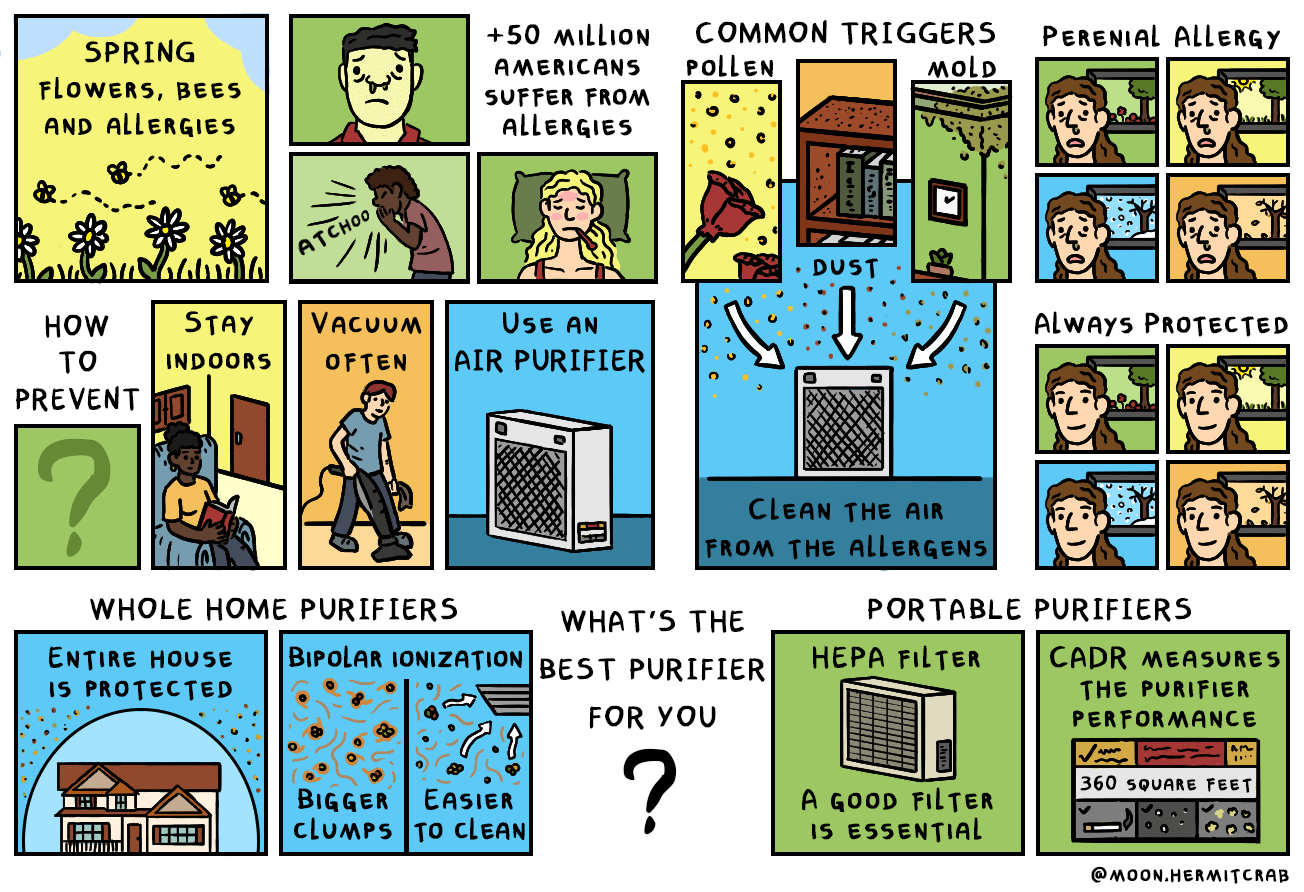One of the more common reasons consumers pursue home air purification is for allergy relief. We spend a majority of our time indoors, and the home is truly the one and only place you really have control over air quality. For the more than 50 million allergy sufferers across the country, ensuring clean air and clean living spaces is a necessity.
Whether the concern is year-round hay fever, seasonal allergies or something more specific, creating a healthier indoor living environment is an easy way to help alleviate allergy symptoms. And looking beyond antihistamines, eye drops, tissues and throat lozenges—air purification offers a powerful alternative.
Common Airborne Allergens
It’s helpful to understand why and how allergies are such a persistent problem in indoor spaces. Indoor air circulation easily spreads allergens. If they’re not removed from the air supply, they also settle onto floors, carpets, walls and furniture in the home. Some of the more common indoor airborne allergens include:
- Dust
- Dust Mites
- Mold Spores
- Cockroaches
- Pet Dander (Cats, dogs, birds and rodents)
- Fabric (Including furniture, clothes, toys, bedding, carpets, etc.)
- Houseplants
- Pollen
Whether you suffer from seasonal or year-round allergies, the aforementioned indoor pollutants likely contribute to your symptoms. All are allergens that can lead to itchy eyes, nose and throat as well as difficulty breathing, sneezing and nasal congestion.
The best way to prevent indoor allergies is to reduce the source, that is, the allergens themselves. However, keeping a home entirely devoid of dust and incoming pollen is near impossible. Plus, giving away the family pet is likely not an option. So, the next best step? Investing in a home air purifier.
Air Purifiers To Reduce Allergies
Air purifiers improve indoor air quality by reducing the number of indoor air pollutants and contaminants in a given indoor space. Allergens are just one specific kind of indoor pollutant the purification process helps eliminate.
Recent studies have shown that air purifiers help reduce allergy symptoms. One study found that allergy symptoms lessened after just four weeks of using an air purifier. Also, the EPA suggests using air cleaners as a helpful way to combat indoor allergens. While air purifiers are not considered a cure-all, they can help drastically alleviate the inconvenient symptoms all allergy-sufferers are familiar with.
Best Air Purifier for Allergies
If eliminating allergies with an air purifier is possible, then naturally you’ll want the best option available. There are plenty of purification systems on the market. Our suggestion: opt for a whole-home system that has been verified with third-party testing.
 Air Purification Regulations: Third-party verification is incredibly valuable. For consumers, its a way to ensure you’re buying a safe and effective device. →
Air Purification Regulations: Third-party verification is incredibly valuable. For consumers, its a way to ensure you’re buying a safe and effective device. →Why whole-home over portable units? Standalone systems or single-room purifiers just can’t do as good of a job as whole-home systems. We’ve gone in-depth on this topic previously, which you can read more about here. Our main takeaway is the advantage of choosing a purifier that works in tandem with the existing home HVAC system.
A whole-home purifier installs directly into the existing HVAC system. That means every time the AC, heat or even the system fan is turned on, the air in your indoor space is also actively purifying. Considering we all rely on our HVAC systems for daily use, you want to make sure the air entering the spaces you frequent is the cleanest air possible.
Active Air Purification
The better whole-home air purification systems are options that include an active component. As in, purifiers that actively seek out indoor pollutants and reduce their spread. A way to achieve this is through dual active air purification—or ionization and oxidation processes. With it, the air is filled with positive and negative ions. This likely sounds strange, but the result is air particles are encouraged to clump together, making them bigger and easier for your home’s filters to capture and filter out. This, in turn, improves filtration, reduces the number of indoor allergens and creates better air quality overall.
Active air purification truly helps allergy sufferers. The exact allergens worsening your indoor air quality will depend on location and living habits. For example, cockroaches are more common in city buildings and homes while specific pollen issues depend on the local climate. But part of the reason indoor allergens are actually worse compared to outdoor allergens is because of how long they remain indoors. Take pet dander specifically, which is one of the worst indoor offenders, dander remains in the air far longer than any other allergen.
This is one of the key reasons whole-home active air purification is an ideal solution. You need a purifier that is working around the clock to sanitize and purify both the air and surfaces in your home. And by choosing a whole-home solution, you’re choosing a low-maintenance and trouble-free indoor air quality upgrade that will improve the health of you and your family.
Choosing Whole-Home IAQ Solutions
A whole-home purification solution is an incredibly powerful tool and healthy home upgrade that can help reduce allergies. Air purifiers work to actively improve home air quality and help to reduce the pesky common indoor airborne allergens from creating or worsening allergy symptoms.





